[gallery id=1592]
Drive Motor Retail tempted Chris Roberts back into the driving seat almost 12 months ago, after an almost five-year break from running franchised dealer groups, his last being Thurlby Motors in Lincolnshire.
During those gap years, however, Roberts was rarely far from a dealership. He spent three years as Vauxhall’s retail network development director before General Motors Europe in Germany called and he became the overseer of all 5,500 Opel and Vauxhall dealers across Europe, responsible for strategic planning, brand image, performance management and dealer training through the Opel Academy.
[gallery id=1592]
It was the perfect opportunity to get involved with a business that’s really strong, that has good ethics and morals, that’s very people-oriented and that has been very successful over the years, and to try to develop the business further.”
Drive Motor Retail tempted Chris Roberts back into the driving seat almost 12 months ago, after an almost five-year break from running franchised dealer groups, his last being Thurlby Motors in Lincolnshire.
During those gap years, however, Roberts was rarely far from a dealership. He spent three years as Vauxhall’s retail network development director before General Motors Europe in Germany called and he became the overseer of all 5,500 Opel and Vauxhall dealers across Europe, responsible for strategic planning, brand image, performance management and dealer training through the Opel Academy.
When Drive’s previous managing director, Chris Elvidge, decided to move on, the group’s co-owners, Steve Bessex and Paul Manning, gave Roberts a call. They had known him since they had formed the group in 2003, in a management buy-out of Vauxhall and Kawasaki dealerships from Arriva. The deal was part-funded by Vauxhall’s Motors Holdings operation and Roberts, a network development manager at Vauxhall at the time, led the brand’s representation.
Roberts was receptive to their phone call: “It was a good opportunity for me to come back to the UK and be involved at a senior level.
“I’d been in Germany for two years and knew I would have to come back at some stage, and this was the perfect opportunity.”
The business has performed well for years and staff turnover is low, he said. That its people are so highly valued fits Roberts’ own ethos, that it is the staff who drive the business.
“A massive list” of people have more than 10 years’ service with Drive, he said, and many of its general managers have grown with the group. Roberts said it is beneficial to always look within the business first when seeking to appoint new managers, because they know the business and understand the group’s culture.
“We have a set of values around people, marketing, customers, products, and it is ingrained in everybody to try to live and breathe that.”
“People are not just treated like a number. They see that they can contribute and get rewarded for that contribution. It gets difficult as the business gets larger, but everybody knows everybody’s names, no one is a shadow in the corner, and that’s important. Steve and Paul historically have been well involved with virtually everybody on every site.
“It’s run much like a family business, while it has a lot of PLC characteristics in terms of operations and processes. Both are part of the success of the business.”
Roberts first demonstrated his ethos to AM when he was running Thurlby Motors. Although the three-site Vauxhall dealer’s revenues were only an eighth the size of Drive’s, Thurlby lacked robust operating controls and processes and its profits were slim. After arriving in 2006, Roberts identified a need to professionalise the business, ensuring performance at each site was monitored by the week, month and quarter, and keeping focus on margins, stock profile and stock turn, cash control and tracking debtors.
It was a different story in 2017 when he arrived at Drive. The manufacturer partner was the same – still Vauxhall – but the group was already well under control.
“We manage everything to the nth degree. We have very good processes, which we measure and monitor. The team understands the processes and follow them. We use the terminology ‘what matters, matters’. We measure all the relevant KPIs, for example used car profitability, per unit profitability, F&I income, service efficiencies, parts and labour sales, days in stock. Then we control the expense base.
“If you get the basics right, it tends to work. Often you see people when their volumes are off and they suffer with F&I performance as well. You can’t have one and not the other.
“You drive traffic, but if it’s just not possible, because the market is flat, you have to do everything else exceptionally well to offset that. That’s what we do.”
The group has a call centre at Redcar with 34 employees, who cover the entire business for sales and aftersales bookings, including outbound marketing activity. It controls the booking process, and frees staff at the showrooms to spend more time with customers.
Drive has recently installed a new telephone system across the group, which gives managers the ability to see call volumes, time to answer, and length of calls, so they can monitor for high-quality conversations.
“We have management information we can now use on a proactive basis, so one of the objectives for me is to get people managing in the day, to try to improve the day or week we’re in, rather than look retrospectively at what we could have done. Influence the future, as opposed to analyse the past.”
Roberts is a proponent of real-time reporting and Drive holds daily sales meetings to set the objectives for the day and discuss any potential issues and how these will be handled.
“The professional and proactive businesses will do that, more and more, and probably should have been doing it anyway.”
Drive’s plan for 2018 is to grow revenues by more than 10%, mostly organically, to about £250 million.
“Like any group, we are looking for opportunities with the existing business to do more with what we have. To leverage all the efficiencies we can, as the market is tough. There is some growth in used cars, for sure. Some of the big groups are looking at separate used car opportunities – we’ve got big sites, so I’m not sure we need separate premises for that, but we can certainly do more with used cars on the sites we’ve got.”
Drive’s dealerships are beginning to stock more used cars from outside the Vauxhall franchise, to bring in more buyers.
“If you focus on Vauxhall in isolation, you are appealing to probably 9% or 10% of the public, whereas if you have a more general mix of stock you can appeal to a wider customer base,” said Roberts.
The decision to look beyond Vauxhall is partly born of necessity – Vauxhall’s new car market share has declined by 4ppts since 2010 to below 8% currently, and new owner PSA Group puts profitability above outright new car volume.
Roberts believes there is growth to come from the aftersales department too, thanks to sales of about 6,500 service plans per year, which banks work for the future. Plans are sold primarily at the point of vehicle sale, but the contact centre will sell renewals when plans are expiring.
“We’ve got big workshops configured for a 12-13% market share, so we will need to backfill that if the low market share continues.”
Trade parts are very important for the business too, given the volume of Vauxhalls in the older car parc that are repaired and serviced by independent garages. Drive has four Vauxhall Trade Parts Club operations, in Bristol, Taunton, Aldershot and Leicester, each of which provides deliveries to independents across a wide territory.
“It’s huge, you’ve got to be big at it. The theory is that you can give a more professional level of service if you’re specialising in the trade as opposed to playing at it. It does work. We make a lot of investment in that, and do a good job in terms of trade service levels and first pick, and we’re getting really good results coming in from all the trade operations.”
Roberts said Drive participates in all Vauxhall’s programmes and has a very strong relationship with the brand.
“As we’re solus with Vauxhall, it’s very important that the relationship we have is first-class. We understand their problems, they understand ours, and we can have a mutual conversation.”
Drive understands that Vauxhall has to address its own business model. Roberts said the cars have never been better and he believes the brand will fix its own internal issues and get profitability back.
“That’s important for both of us, because if the manufacturer can be profitable that benefits the whole value chain. We’re looking forward to it, because it will be good for the business and good for dealers.”
Roberts said Vauxhall’s current refranchising exercise and the likely reduction in the number of sales points in Vauxhall’s network will benefit the franchisees who continue with the brand, by protecting their sales throughput despite the brand’s smaller market share. Strong dealers have little to fear from the exercise, he said.
Drive’s financial records certainly show strength and resilience. Since 2007, its profitability has only once dipped below 1% return on sales, and that was in 2008 when the economy was in crisis and many other motor retailers posted losses, whether with Vauxhall or other brands. Its pre-tax earnings have averaged £2.8m per year over the same period – profits which are reinvested in the business.
Roberts’ remit is to grow the group further, through organic channels at its existing sites and by working with finance director Stuart Harrison, plus Bessex and Manning, to identify acquisition opportunities. Shortly after Roberts joined last summer, Drive took over the Martin Rumble Vauxhall business in Nuneaton, which is integrating well, he said.
Bessex and Manning, now both in their early 60s, come in for bi-monthly board meetings, but both stepped back from daily operations when Elvidge became managing director in 2014.
Drive’s 12 Vauxhall outlets are spread from Bristol in the south west to Bury St Edmunds in East Anglia and from Aldershot in the south as far north as Hartlepool. Roberts currently spends more than two weeks a month away from his office visiting every dealership for full site reviews with each outlet’s management team.
“It’s essential to keep close to the business, so we know what’s happening. It’s a very robust review. We go through all the key metrics to make sure they’re on track, including the financials, but also operational measures, such as customer satisfaction scores and stock turn,” he said.
Drive already has group-level managers or directors for F&I, training, and aftersales. Roberts will soon recruit a group operations director, who will take on some of the daily management tasks so Roberts can spend more time on strategic developments.
“Sometimes it (being strategic) needs more time and effort, and as we grow and get more sites that time becomes even more diluted,” he said.
In the longer term, the group wants to add more dealerships, acquiring “businesses with a really good fit, ethically and process- and business model-wise”, said Roberts. “We’re not looking to conquer the world, but we would grow as opportunities come up.”
He wants more Vauxhall dealerships and other brands that do not directly compete with Drive’s long-term partner. Mid-market brands could be a particular opportunity, he said, as it is generally a volume business and these would provide sufficient opportunity.
Geography will be key, he said, as with Drive being “in all four corners of England and the centre as well” it could benefit from developing more “clusters” of dealerships. The clusters it already has, such as its five outlets in and around Bristol, allow for easier staff promotion into junior and middle-management roles.
Drive owns the freeholds of most of its dealerships, with a couple leased. “It’s the sensible option – sound foundations,” said Roberts. In 2017, its sale of one freehold property netted a £5.9m exceptional profit.
The group’s approach to technology should also help when it acquires new sites. Drive uses CDK’s Autoline Drive dealer management system (DMS) for everything – the only bolt-on is CitNow’s video software, and it uses no other alternate or additional systems, unlike some dealers which shun some of their DMS’s capabilities and add third-party showroom systems or workshop software. Roberts said Drive always aims for strong partner relationships, and made the strategic decision to fully buy into CDK and use it to its full capacity. As a result, it has strong support from the DMS provider, and integration of acquisitions should be relatively smooth.
Drive’s management team weighs up the costs of doing business and tries to leverage those costs to its advantage. Roberts cited the example of the national minimum wage and apprenticeship levy, and said Drive has invested in “growing our own”. It has apprentices across workshop, parts and accident repair to try to gain the maximum benefit for what it pays out. Vauxhall’s training programme gets them proficient in a reasonable timeframe, he said, so they are soon productive for the business.
“We get a benefit in year two and increasingly so in year three. In year two they’re doing some basic maintenance and repair jobs and they start to generate some income.
“The recruitment and training of technical people is going to become more and more critical as telematics grows. Systems for crash protection, intelligent cruise control, lane detection, radar systems all take a bit more brain power, so the training in that is all the more critical to ensure safety is maintained,” he said.
Asked about how motor retailers can attract better people, Roberts, who served on the board of the Institute of the Motor Industry before his Germany posting, said he believes the industry still lacks a well-known career path. It can’t simply market its jobs to young people, when they desire a career. Drive’s dealerships work with local schools and colleges to improve awareness, he said, but the industry still has a way to go.
Making accident repair profitable
Drive has bodyshops adjacent to 10 of its Vauxhall dealerships, which is rare nowadays in a franchised dealer of its scale. Over the past two decades, many dealers exited accident repair due to the specialist operations it requires and slim earnings from insurance companies, so to have 13 dealerships and 10 bodyshops is exceptional.
Roberts said the bodyshops are very profitable in their own right, and only about 15% of their work is Vauxhall repairs. Many sites work with multiple insurers and work providers, such as Fix Auto. They also offer SMART repairs for retail and fleet customers.
“We are highly rated by insurance companies and work providers. It’s all about process and people again. We hit the KPIs – job turnarounds, cycle time and key to key time, and quality. Getting it right first time is important.”
He said the pendulum has swung back a bit from the last decade when independent bodyshop chains were taking work away from franchised dealers. Because of the technical nature of many of the repairs now, and the crash protection systems, more work is coming back to manufacturers’ approved repairers, who have the expertise, the specialist tools and the training. One example of this is the need to realign cameras and sensors that form part of ADAS (advanced driver assistance systems) built into windscreens of some cars. Failure to do so could make the car unsafe to return to the road.
“The bodyshops are an integral part of the business. It makes us a one-stop shop for the consumer, we can look after all their needs – new, used, service, parts, accident repair, SMART repair.”
Roberts believes the heavy investment franchise dealers make in aftersales equipment and training will be justified by the expertise needed to deal with current and future technology in cars: “I’m not sure you can keep up (with technology) unless you make that investment.”
Login to continue reading
Or register with AM-online to keep up to date with the latest UK automotive retail industry news and insight.




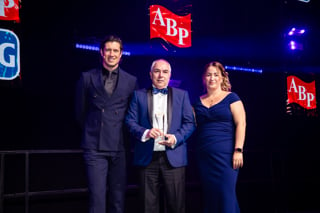
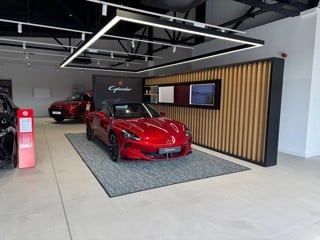
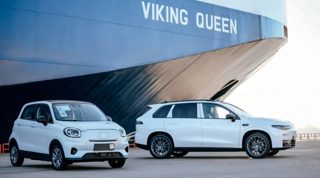
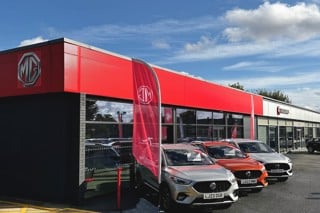
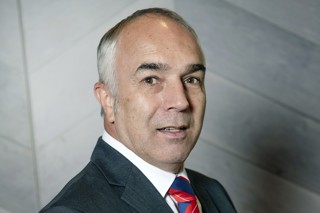












Login to comment
Comments
No comments have been made yet.